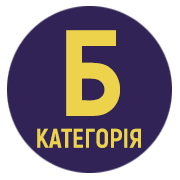FORMING THE AESTHETIC COMPENENCE OF FUTURE JOURNALISTS IN THE EDUCATIONAL PROCESS OF A PROFESSIONAL COLLEGE
Abstract
The article highlights the peculiarities of forming the aesthetic competence of future journalists in the educational process of a professional college. It is claimed that the training of the noted specialists for the professional activity should be aimed at the developing their need to learn about beauty, understand the aesthetic values, acquire deep humanitarian knowledge about the patterns of development of national and world art. It is pointed out that the aesthetic competence of future journalists is appeared in the presence of aesthetic knowledge, aesthetic judgements, emotions, values, ideals, behaviour, etc. It has been found that aesthetic competence is an important part of the effective educational and extracurricular upbringing work concerning the formation of future journalists’ professional skills. The pedagogical conditions that influence the formation of the aesthetic competence of students of this level are highlighted. It is proposed the author’s own definition of the aesthetic competence as the ability to aesthetically perceive and understand beauty, express aesthetic judgements, show emotions, understand cultural values, have an adequate attitude to ideals, etc. It is argued that forming future journalists’ aesthetic competence is a long-term process, the effectiveness of which depends on the complex educational activity of lecturers of professional colleges. It is noted that forming future journalists’ aesthetic competence it is advisable to carry out in the course of studying the discipline «Art (History of Ukrainian and Foreign Culture)». There has also been stated that the effectiveness of the formation of this competence in future journalists increases in the course of their comprehension of the general cultural and aesthetic components of the educational material. The structural components of the aesthetic competence are considered and methods of its formation in the educational process of the professional college are proposed, among which the leading role is given to research and development activities. A perspective direction for the further research of the problem raised it is defined the development of the ways of integrating the material of academic disciplines.
References
Білан, І. (2021). Дефініції поняття «естетична компетентність» у психолого-педагогічній літературі. Inter Conf, (59). URL: https://ojs.ukrlogos.in.ua/index.php/interconf/article/view/13159
Боклах, Д. (2023). Теоретичні аспекти формування естетичної компетентності майбутніх учителів англійської мови. Інноваційна педагогіка. Теорія і методика професійної освіти. 63, 79–81.
Галіцан, О., Койчева, Т., Осипова, Т. (2020). Методичний ресурс формування естетичної компетентності майбутніх учителів гуманітарних спеціальностей. Науковий вісник Південноукраїнського національного педагогічного університету імені К. Д. Ушинського. Сер. «Педагогічні науки». 1, 7–13.
Газунова, Л. (2012). Формування естетичної компетентності майбутнього вчителя-філолога. Педагогічні науки: теорія, історія, інноваційні технології. 6, 268–274.
Грищенко, Т. (2023). Індивідуальна освітня траєкторія як засіб формування естетичної компетентності майбутніх учителів початкової школи. Вісник Черкаського національного університету імені Богдана Хмельницького. 2, 173–179.
Дяченко, М. (2013). Особливості соціалізації майбутніх журналістів у процесі підготовки до професійно-творчої діяльності. Соціальна педагогіка: теорія та практика. 1, 45–55.
Карам, A. (2019). Сутнісні характеристики феномену «естетична компетентність особистості». Педагогічна освіта: Теорія і практика. Психологія. Педагогіка. 32, 81–86.





